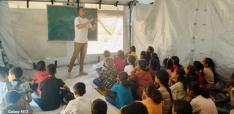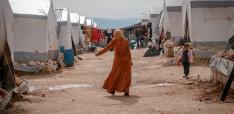Don’t Call it an “Anniversary”: Russia’s Full-Scale Invasion of Ukraine at the One-Year Mark

Remedying largely unknown rhetorical issues in coverage of the war.
After Russia’s full-scale February 24th invasion of Ukraine, those sympathetic to the defenders began using Ukrainian names and pronunciations, ending the common Russian nomenclature. The long overdue shift is important because language is political. Commendable progress has been made, but as we approach the one-year mark of Russia’s intensified aggression, several other issues of language and narrative must be addressed. First and foremost, we should not refer to February 24th as an “anniversary.”
In English, the word anniversary is neutral. However, without specific context, it is colloquially understood to refer to a positive event. In Ukrainian, though, “‘anniversary’ has three definitions, each used in different contexts,” explains Ivanna Kuz, a Ukrainian-American who is currently a Transatlantic Defense and Security Program Officer at CEPA.
The word “anniversary” typically translates to “ювілей,” which in pronunciation and meaning is closest to “jubilee.” Ms. Kuz goes on to say that, “for a funeral you would absolutely not use that term but would instead say ‘роковини.’ Then there is ‘річниця,’ which is a bit more neutral, and can be used both for something like a wedding anniversary and for more somber occasions. It is less celebratory than ‘ювілей’ but usually jollier than ‘роковини.’”
This brings us back to the first translation. In both English and Ukrainian, the word jubilee suggests joy, celebration, and liberation; everything Russia’s 2022 full-scale, explicitly genocidal, invasion of Ukraine isn’t. Thus, if we are to be sensitive to the plight of Ukrainians, it may be better to use phrases such as “marking the first year of Russia’s full-scale invasion of Ukraine,” “commemorating those lost to Russian aggression in Ukraine,” “one-year into the Kremlin’s 2022 assault on Ukraine,” “marking one-year since Putin’s February 24 conquest,” etc.
This issue is indicative of a larger problem: how we discuss Russia’s war against Ukraine often harms Ukrainians and amplifies Kremlin propaganda. Phrases such as the “Ukraine War,” “War in Ukraine,” “Special Military Operation,” and “Ukraine-Russia War,” either omit the existence of the responsible actor, imply equal culpability, or worse, place the blame on Ukraine. Better framing includes, “Russia’s invasion of Ukraine,” with the caveat that without further context it can imply this is the first time in recent history that Kremlin forces crossed the border, effectively ignoring Moscow’s military actions since 2014. Referring at least once to the most recent invasion as “full-scale” may be one way to remedy this latter issue.
These examples just scratch the surface. There are numerous myths regarding Putin’s motivations, some of which are relatively new, and many of which are rooted in Soviet and Russian Federation interests and disinformation. For all the existing rebuttals of their false claims, a few key facts are often overlooked, and should be regularly emphasised.
First, Putin has said on multiple occasions that Ukraine is “entitled” to independently decide if it wants to join NATO, and that he doesn’t view its membership as “something that could cloud the relations between Russia and Ukraine” (see also). Second, he’s previously recognised Ukraine’s sovereignty and the integrity of its borders. As recently as 2008, he stated that Crimea is Ukraine’s, that there are virtually no ethnic conflicts there, and whatever frictions exist are Kyiv’s responsibility, not Russia’s. Further, he asserted that any statements to the contrary are provocations.
Third, NATO enlargement hasn’t always been viewed as a major threat by Russia—Putin himself said in 2001 that “we do not view NATO as a hostile organization”—and arguably it still isn’t. Instead, it is treated as an irritation. When the Baltics, on Russia’s border, sought membership at the turn of the millennium, Putin and other Russian leaders viewed it as their prerogative and not a significant issue. Even after their 2004 accession, there were no military threats posed by their participation in the alliance. Foreign troop presence was negligible until Moscow’s 2014 invasion of Ukraine, and even then NATO’s footprint only mildly increased. Reinforcing these points, in May 2022, the Russian president stated that Finland and Sweden joining NATO isn't a threat. What must be emphasised is that the Russian establishment’s true fear is a functioning, Slavic, liberal democracy on its border that can demonstrate an alternative form of governance is indeed possible.
Finally, there are Russia’s accusations that the government in Kyiv and anyone that identifies as Ukrainian are some combination of Nazis, Jews, Satanists, drug addicts, and LGBTQ+ people bent on destroying “traditional Christian values” at the behest of Western nations permeated by these boogeymen. Despite their disturbing resonance with foreign audiences, these absurd claims are primarily directed at the regime’s domestic audience for the sake of internal stability and the dehumanization of its victims, which Russian leadership insists must be eliminated wholesale.
However, such propaganda also obfuscates the Kremlin’s deliberate fostering of violent far-right movements at home and abroad, including a variety of neo-Nazis groups. These efforts entail endorsements of extreme social clubs, religious organizations, youth camps, militias, and mercenaries. At the same time, such narratives distract from the influence of fascist philosophers on Putin’s policies and on the leadership and current character of the Russian Orthodox Church. In combination, these factors have allowed Putin to intensify his expansion of the Russian empire, while also deepening the regime’s illiberal and fascist traits.
We must continue to think critically about these narrative issues while researching and countering Russian propaganda. Further, we need to find ways to penetrate Russia’s increasingly controlled information sphere, where the media has steadily become more genocidal and apocalyptic. Both objectives could be pursued in part by enhancing existing infrastructure, such as the recently proposed “Radio Free Russia project.”
In any case, should you have the opportunity, talk with Ukrainians, as well as with Russians who actively oppose the invasion, Russia’s imperial ambitions, and the genocide of Ukrainians (not those who simply want a reduction of violence). Their perspectives are vital in this quest for peace and justice. For the moment, especially with February 24th approaching, not calling it an “anniversary” is the least we can do.
Special thanks to Ivana Kuz, who brought the problem with the use of “anniversary” to my attention.
Grant W. Turner is currently an analyst for The Jamestown Foundation, a research assistant at The Yorktown Institute, an intern with the Transatlantic Security and Defense program at the Center for European Policy Analysis, and a regular contributor at the Realist Review, while pursuing a second master’s degree, an MA in Statecraft and International Affairs at The Institute of World Politics. Grant previously interned full-time at The Jamestown Foundation for all of 2022, primarily monitoring Russia’s invasion of Ukraine for the president and assisting the Eurasia Daily Monitor (EDM) publication. Grant has been published by RUSI, EDM, Global Policy Journal’s Blog, Stealth War, Realist Review, and Plot Politics. He may be followed on Twitter and LinkedIn. His opinions and analyses are his own.
Image: Denis Bondariev via Flickr (CC BY-SA 2.0)


